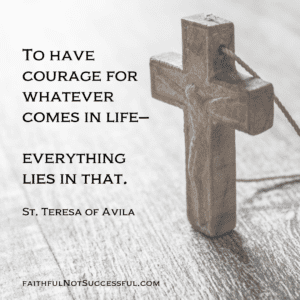
Radical abandonment in theory and practice
If you follow me on Facebook or Instagram, you might already know that I have spent several weeks since mid-February in and out of the hospital with one of our children, who is facing unexplained and increasingly troubling symptoms. It’s been a whole new training ground in a sport I’m all too familiar with: radical abandonment.
This most recent experience with our son’s mysterious ailment is unlike anything we have ever endured in a medical setting… and we have endured rather a lot compared to many families.

Stillness and Smallness
Last November, Todd’s father died unexpectedly. Since then, as one crisis after another has hit our already-reeling family, I have been getting a strong sense during prayer that I am supposed to be moving toward two things: stillness and smallness. With every new twist, the voice gets more insistent.
I’ve had to unlearn a lot of the narratives about myself I pieced together during Oscar’s story, the one I recount in my forthcoming book, Awakening at Lourdes. To make sense of that previous journey, I told myself I am a fierce advocate, a willing collaborator with our kid’s medical team, someone who can work hard to get what he needs.
I folded those descriptions into my core identity.
It’s not really working anymore.
We have had some pretty painful encounters with medical professionals who simply don’t believe what we know to be true… and we are powerless against their disbelief.
We have found ourselves in multiple situations where no amount of discussing, cajoling, or hard work can fix the thing in front of us, any more than scratching your thumbnail against St. Peter’s Basilica could wear it down, atom by atom.
Radical abandonment is pretty radical
Whatever you want, Jesus.
I have been thinking and writing about the concept of radical abandonment, the idea that you turn every last breath over to God. I’ve done it flippantly in some places, more thoughtfully in others. Like this Instagram post on why children’s hospitals are a great place for radical abandonment.

I posted that during the second of what is now four (maybe soon to be five?) inpatient admissions with our son. The third admission was a Rubicon moment, one that immediately put that statement to the test. I was young and earnest back then in February 2021, sadder and a bit wiser now.
But what I said is still true.
When you make loud public noises about radical abandonment, you’ll definitely be asked to radically abandon something very soon.
And God’s power always picks up right where ours gives out. (It’s also true that usually, He knows we have more to give than we believe we do.)
Abandonment: not just an Insta caption
We aren’t abandoning hope on our son or finding him more/different/better medical help.
But I am abandoning the idea that this problem is something I can solve with a little more moxie and a few more PubMed articles. (And it only took me six weeks this time, instead of twelve months and an international pilgrimage.)
It’s been me and Jesus alone in a room, talking about our son. I thought I meant Whatever you want, but it turns out what I meant was something more like Whatever you want as long as I understand it and get to participate in it.
Nope. He’s asking for complete abandonment, full stop. Hands off the wheel. Standing at the cliff edge.
Stiller, smaller. Totally his.

Offering it up (AKA leveling up in radical abandonment)
I’d love to hear your thoughts on radical abandonment, or any prayer intentions I can carry for you (here’s more on why offering up our suffering is a powerful tool). Drop a comment below, or email me.
